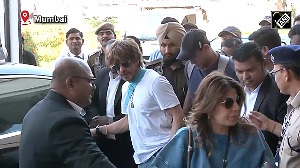 Late Prime Minister Indira Gandhi had given the nod for Operation Blue Star but later regretted the decision, which eventually led to her assassination 25 years ago.
Late Prime Minister Indira Gandhi had given the nod for Operation Blue Star but later regretted the decision, which eventually led to her assassination 25 years ago.
The country's only woman prime minister, who died on October 31, 1984, equally regretted her another controversial decision -- imposition of Emergency -- that had shaken the country, say her close aides.
"Gandhi regretted both the decisions on Operation Blue Star and Emergency. The shape that the two incidents took later was not exactly the same for what Gandhi had taken these decisions," said R K Dhawan, her personal secretary and close aide.
Dhawan said that the first six months of Emergency went "very good" but after then things went out of control and then she "off course regretted" the step.
"In 1973-74, the Opposition parties had created so much of ruckus; they had created all sorts of problems for Gandhi. Then it was thought of that some corrective measure had to be taken," he said.
According to Dhawan, the decision to impose Emergency was taken way back in January 1975 much before it was actually imposed on June 25, 1975 but it was delayed as it was not decided by then what should be the exact mode of action. The decision was later taken after consultation with legal experts, he said.
Gandhi fell victim to her own Sikh bodyguards -- Satwant Singh, Beant Singh and Kehar Singh -- who pumped 31 bullets into the 66-year-old charismatic leader.
While Beant was killed by security men, Kehar and Satwant were later hanged.
M L Fotedar, another close aide of Gandhi, termed Emergency as a measure taken in compulsion saying, "Her opponents created such a situation in the country that she had to impose Emergency".
Regarding Operation Blue Star, Dhawan said she was told that no damage would be done to the structure of Golden Temple and there will be no loss of human lives before she had given the nod for the operation.
"She (Gandhi) was told that it (Operation Blue Star) will be a simple operation. No damage will be done to the structure and there would be no loss of human lives. She was also told that terrorists would be flushed out of the temple in no time," he said.
"Though Gandhi was not informed that tanks would be used during the operation, it is true that once the army operation started, it was difficult to stop it," Dhawan said.
According to Fotedar, "Operation Blue Star was her compulsion. There was no alternative left to stop terrorist and other disruptive activities".
On the criticism faced by Gandhi after the operation and the anger of the Sikh community, he said, "Gandhi did not want to hurt any community or religion. This was the only option left to her to protect the country from outside forces".






 © 2025
© 2025